
More than a desktop Linux companion. Much more.
The ECOfile is an external companion system within the
ECOS range, designed primarily as a dedicated file server
and print server for RISC OS environments, while also
operating as a fully featured Linux desktop computer. It is
aimed at users who want a centralised, always-on hub for
file storage, backup, and printing, but who also value the
flexibility of a modern Linux environment alongside their
RISC OS systems.
At its core, the ECOfile uses an ARM-based Raspberry Pi
base paired with 8 GB of RAM. Storage is provided by a
1TB SSD as standard, with an optional dual-drive
configuration available to increase capacity. The unit is
housed in a compact external enclosure and powered by
an external PSU, offering flexibility in placement —
whether on a desk, in a media cabinet, or alongside other
network hardware.
File Sharing and Network Integration
The ECOfile serves as a centralised file store accessible
by multiple RISC OS systems and other devices on the
same network. It supports standard cross-platform file-
sharing protocols such as SMB/CIFS (Samba), enabling
seamless access from RISC OS, Linux, Windows, and
macOS systems without complex configuration.
RISC OS users can connect directly using OmniClient,
LanMan98, or even FTPc via the integrated FTP service,
opening, editing, and saving files directly to and from the
ECOfile without needing to copy them locally. Configurable
user permissions allow specific folders to be restricted or
shared collaboratively across multiple machines, making it
ideal for home, educational, and office networks.
To enhance convenience, the ECOfile includes automatic
mounting of USB drives, allowing removable storage
devices to be accessed and shared across the network as
soon as they are connected. This feature simplifies tasks
like data transfer, backup, or temporary file exchange.
Print Serving
The ECOfile includes full print server functionality using
the CUPS (Common Unix Printing System) framework.
This enables both USB and network printers to be shared
with any RISC OS system on the network, even where
native drivers do not exist.
In practice, the ECOfile manages all rendering and driver
support internally under Linux, presenting the printer to
RISC OS as a standard network device. This significantly
broadens the range of printers that can be used within a
RISC OS environment to include modern multifunction
inkjets and high-performance laser printers, while allowing
multiple RISC OS systems to share a single printer without
direct connection.
Web Interface and Application Platform
The ECOfile features a built-in web management interface
that can be accessed directly from RISC OS using the Iris
Browser or any modern web browser. This intuitive
dashboard provides access to configuration tools, system
monitoring, file management, and installed applications.
An integrated AppStore allows users to expand the
ECOfile’s functionality with a wide range of optional
packages, including Pi-Hole for network-wide ad-blocking,
online office suites, web-based file browsers, and other
productivity tools. Installation and updates are managed
through the same interface, requiring no command-line
experience.
Cloud and Remote Access Capabilities
The ECOfile can integrate with several popular cloud
storage providers, enabling synchronisation and remote
access to files without requiring additional hardware. Users
can configure accounts to automatically mirror or back up
selected directories between the ECOfile and cloud
services, ensuring important data remains accessible
across devices.
The built-in web interface also provides secure access to
files and folders , with support for user authentication and
optional two-factor security. This allows RISC OS systems,
which may lack native cloud clients, to benefit from
accessing modern cloud storage indirectly via the ECOfile,
maintaining compatibility while extending connectivity.
In addition to cloud integration, the ECOfile supports
media streaming, calendar and contact synchronisation,
automated back up solutions and remote file sharing,
providing a comprehensive set of tools for both local and
remote users.
Additional Capabilities and Integration
Beyond its primary role as a file and print server, the
ECOfile can function as a full Linux desktop environment
when connected to a display via its dual 4K HDMI outputs.
This enables direct access to Linux applications, including
web browsers, office suites, and media tools. With six USB
ports, it easily accommodates peripherals such as external
drives, input devices, and backup equipment.
Dual-band Wi-Fi and Gigabit Ethernet provide flexible
network options, allowing it to act as both a wired file
server and a wireless bridge. The unit can also serve as a
gateway between RISC OS and other networked systems,
facilitating smooth data exchange across platforms.
An optional OLED status display offers at-a-glance
monitoring of CPU activity, disk usage, network status, and
other system metrics, making it easy to keep track of
performance.
Seamless Integration with RISC OS
The ECOfile’s strength lies in its ability to provide modern
network services in the background while allowing RISC
OS systems to perform at full native speed. Files can be
opened, saved, or printed directly from RISC OS
applications, with the ECOfile handling all the heavy lifting
behind the scenes.
By consolidating file sharing, cloud access, printing, and
peripheral management in one network-accessible device,
the ECOfile simplifies the setup of multi-machine RISC OS
environments while expanding their interoperability with
contemporary technologies.
Technical Specification
Processor Speed:
2.4GHz
Memory:
8GB
SSD Storage:
1TB NVMe storage with optional
NVMe drive capacity
Networking:
Gigabit ethernet port and integrated
WIFI
USB ports:
6
Audio/Video:
Twin full sized HDMI port with audio
Up to 3840x2160 HDMI graphics
OS and Software:
Raspberry Pi OS (other Linux
variants available)
Case:
Ultra compact mini aluminium case -
165mm x 99mm x 35mm
Front Power Indicator LED
Key info OLED screen
Options:
Installation of RISC OS on Linux
plus other emulation systems
16GB RAM (upgrade from 8GB)
Optional NVMe drives (with adaptor)
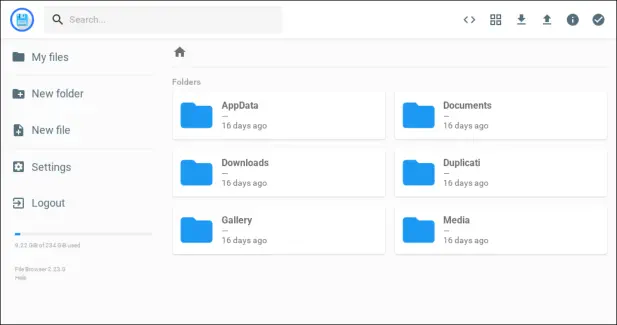
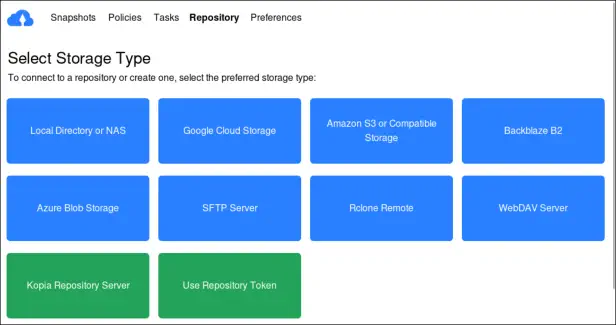
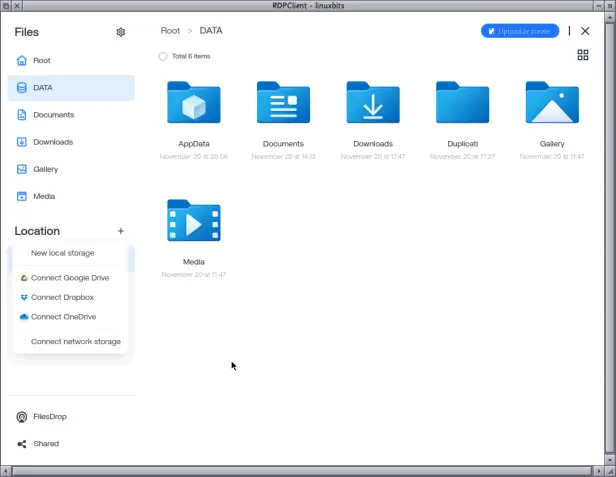
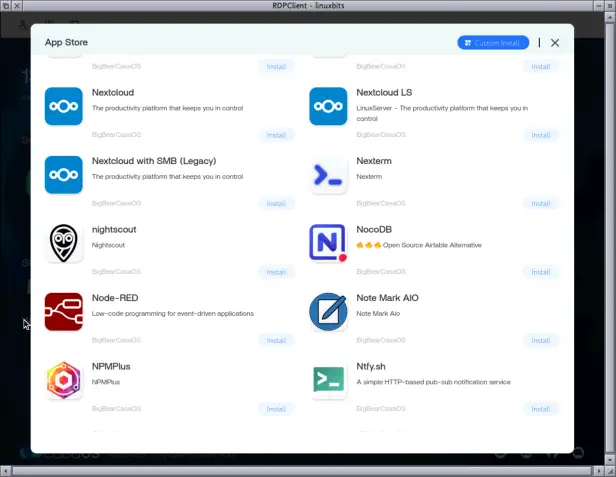
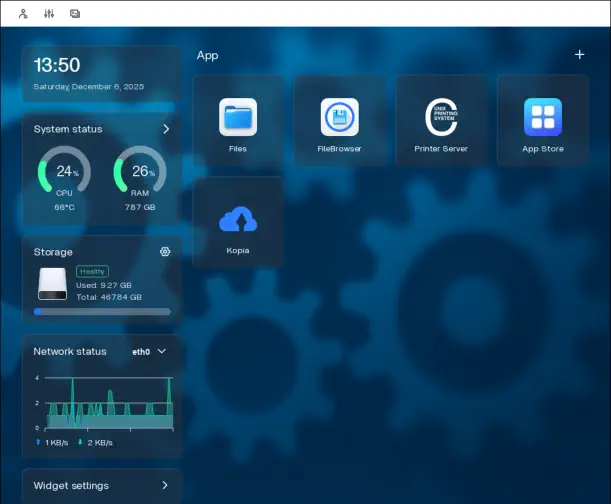




NVMe Drive
Add-on
16GB RAM
Upgrade
Emulation
Station
Upgrades
ECOfile
£249
Follow Us:
£99
£25
£5
Home / Systems / Companions / ECOfile


More than a desktop Linux companion. Much more.
The ECOfile is an external companion system within the
ECOS range, designed primarily as a dedicated file server
and print server for RISC OS environments, while also
operating as a fully featured Linux desktop computer. It is
aimed at users who want a centralised, always-on hub for
file storage, backup, and printing, but who also value the
flexibility of a modern Linux environment alongside their
RISC OS systems.
At its core, the ECOfile uses an ARM-based Raspberry Pi
base paired with 8 GB of RAM. Storage is provided by a
1TB SSD as standard, with an optional dual-drive
configuration available to increase capacity. The unit is
housed in a compact external enclosure and powered by
an external PSU, offering flexibility in placement —
whether on a desk, in a media cabinet, or alongside other
network hardware.
File Sharing and Network Integration
The ECOfile serves as a centralised file store accessible
by multiple RISC OS systems and other devices on the
same network. It supports standard cross-platform file-
sharing protocols such as SMB/CIFS (Samba), enabling
seamless access from RISC OS, Linux, Windows, and
macOS systems without complex configuration.
RISC OS users can connect directly using OmniClient,
LanMan98, or even FTPc via the integrated FTP service,
opening, editing, and saving files directly to and from the
ECOfile without needing to copy them locally.
Configurable user permissions allow specific folders to be
restricted or shared collaboratively across multiple
machines, making it ideal for home, educational, and
office networks.
To enhance convenience, the ECOfile includes automatic
mounting of USB drives, allowing removable storage
devices to be accessed and shared across the network as
soon as they are connected. This feature simplifies tasks
like data transfer, backup, or temporary file exchange.
Print Serving
The ECOfile includes full print server functionality using
the CUPS (Common Unix Printing System) framework.
This enables both USB and network printers to be shared
with any RISC OS system on the network, even where
native drivers do not exist.
In practice, the ECOfile manages all rendering and driver
support internally under Linux, presenting the printer to
RISC OS as a standard network device. This significantly
broadens the range of printers that can be used within a
RISC OS environment to include modern multifunction
inkjets and high-performance laser printers, while allowing
multiple RISC OS systems to share a single printer
without direct connection.
Web Interface and Application Platform
The ECOfile features a built-in web management interface
that can be accessed directly from RISC OS using the Iris
Browser or any modern web browser. This intuitive
dashboard provides access to configuration tools, system
monitoring, file management, and installed applications.
An integrated AppStore allows users to expand the
ECOfile’s functionality with a wide range of optional
packages, including Pi-Hole for network-wide ad-blocking,
online office suites, web-based file browsers, and other
productivity tools. Installation and updates are managed
through the same interface, requiring no command-line
experience.
Cloud and Remote Access Capabilities
The ECOfile can integrate with several popular cloud
storage providers, enabling synchronisation and remote
access to files without requiring additional hardware.
Users can configure accounts to automatically mirror or
back up selected directories between the ECOfile and
cloud services, ensuring important data remains
accessible across devices.
The built-in web interface also provides secure access to
files and folders , with support for user authentication and
optional two-factor security. This allows RISC OS
systems, which may lack native cloud clients, to benefit
from accessing modern cloud storage indirectly via the
ECOfile, maintaining compatibility while extending
connectivity.
In addition to cloud integration, the ECOfile supports
media streaming, calendar and contact synchronisation,
automated back up solutions and remote file sharing,
providing a comprehensive set of tools for both local and
remote users.
Additional Capabilities and Integration
Beyond its primary role as a file and print server, the
ECOfile can function as a full Linux desktop environment
when connected to a display via its dual 4K HDMI outputs.
This enables direct access to Linux applications, including
web browsers, office suites, and media tools. With six
USB ports, it easily accommodates peripherals such as
external drives, input devices, and backup equipment.
Dual-band Wi-Fi and Gigabit Ethernet provide flexible
network options, allowing it to act as both a wired file
server and a wireless bridge. The unit can also serve as a
gateway between RISC OS and other networked systems,
facilitating smooth data exchange across platforms.
An optional OLED status display offers at-a-glance
monitoring of CPU activity, disk usage, network status,
and other system metrics, making it easy to keep track of
performance.
Seamless Integration with RISC OS
The ECOfile’s strength lies in its ability to provide modern
network services in the background while allowing RISC
OS systems to perform at full native speed. Files can be
opened, saved, or printed directly from RISC OS
applications, with the ECOfile handling all the heavy lifting
behind the scenes.
By consolidating file sharing, cloud access, printing, and
peripheral management in one network-accessible device,
the ECOfile simplifies the setup of multi-machine RISC
OS environments while expanding their interoperability
with contemporary technologies.
Technical Specification
Processor Speed:
2.4GHz
Memory:
8GB
SSD Storage:
1TB NVMe storage with optional
NVMe drive capacity
Networking:
Gigabit ethernet port and integrated
WIFI
USB ports:
6
Audio/Video:
Twin full sized HDMI port with audio
Up to 3840x2160 HDMI graphics
OS and Software:
Raspberry Pi OS (other Linux
variants available)
Case:
Ultra compact mini aluminium case -
165mm x 99mm x 35mm
Front Power Indicator LED
Key info OLED screen
Options:
Installation of RISC OS on Linux
plus other emulation systems
16GB RAM (upgrade from 8GB)
Optional NVMe drives (with adaptor)
ECOfile
£249
Follow Us:
Home / Systems / Companions / ECOfile









NVMe Drive
Add-on
16GB RAM
Upgrade
Emulation
Station
Upgrades
£99
£25
£5

























